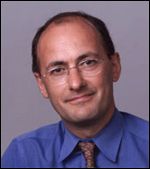MBCC: Hormone-Resistant Breast Cancer-Evolving Management and New Targets
Endocrine-therapy resistant HER2-negative breast cancer is the most common cause of breast cancer death. The basis for this resistance is heavily studied to identify new ways to treat these patients.
Endocrine-therapy resistant HER2-negative breast cancer is the most common cause of breast cancer death. The basis for this resistance is heavily studied in order to identify new ways to treat these patients.

Matthew J. Ellis, PhD, FRCP, Siteman Cancer Center
Matthew J. Ellis, PhD, FRCP, director of the breast cancer program at the Siteman Cancer Center in St. Louis, Missouri is studying these resistant mechanisms to predict which estrogen-receptor (ER)-positive patients will respond to endocrine neoadjuvant therapy.
"Estrogen-receptor expression is prerequisite for a response, but it is not sufficient, so other things are going on in the tumor in some patients," Ellis explained.
To understand the "other things," Ellis and colleagues have sequenced and analyzed samples from hormone-receptor–positive patients participating in neoadjuvant endocrine therapy trials. The sequences of tumors that did well posttreatment were compared with those tumors that did not respond. The study is in press in the journal Nature.
Not surprisingly, the most frequently mutated gene in the resistant tumor data set turned out to be the catalytic subunit of PI3 kinase. "PI3K is a survival pathway so it is a prime example of a pathway you would expect to be linked to resistance because the activation of PI3K suppresses cell death," said Ellis.
The good news is that there are a set of drugs that target the PI3 kinase pathway-mTOR inhibitors, AKT inhibitors, and inhibitors of the receptor tyrosine kinases themselves, all of which are in various phases of ongoing clinical trials.
For example, BEZ235, a dual mTOR/PI3K inhibitor is currently in several phase I and II clinical trials as is BKM120, a pan-PI3 kinase inhibitor.
A phase I trial at Vanderbilt-Ingram Cancer Center is combining either BKM120 or BEZ235 with endocrine therapy in hormone-positive metastatic breast cancer is underway.
Preclinical data show a synthetic lethality relationship between estrogen-receptor activation and PI3 kinase pathway activation-inactivation of both pathways is required for cell death. Inhibition of the PI3 kinase pathway results in cell death, but the cell death is completely suppressed by estrogen, Ellis explained.
Upfront combination therapy is likely to be the only solution to avoid resistance. "These PI3 kinase inhibitors will only work when you tackle the estrogen receptor and PI3 kinase at the same time," Ellis said.
Treatment options
Everolimus, an mTOR inhibitor, is likely to be approved for ER-positive breast cancer based on a recently published trial, says Ellis. "We will all be learning how to use the drug," suspects Ellis.
Having a lot of experience with the drug, he cautions that elderly patients with decreased renal function may need lower doses as there are side effects.
Ellis encourages the use of low-dose estrogen therapy, which is "cheap and effective" in his view, citing a recent study that showed low-dose 6 mg estradiol to be as effective and safer than the 30 mg dose in ER-positive breast cancer patients.
The PI3 kinase pathway is the major focus hormone-resistant breast cancer research. Besides the catalytic subunit of PI3 kinase, mutations for which a therapy can be developed or already exists are infrequent and no other frequently mutated genes have been identified to date.
However, Ellis believes that new models of endocrine-resistant breast cancers will develop, using patient tumor samples. The advent of new technologies and approaches will also likely help facilitate the identification of new mechanisms of resistance.
"The challenges in 2012 are not the availability of drugs. The bottleneck is the limited availability of validated therapeutic targets and identifying the target patient population," added Jorge Reis-Filho, MD, PhD, professor of medical pathology at the Institute of Cancer Research in London, England.
As Dan Osman, MD, breast cancer surgeon and chair of the Miami Breast Cancer Conference stated, "Progress in this field will be based on a marriage between the molecular biologist and the clinician. These two are just beginning to speak to each other."